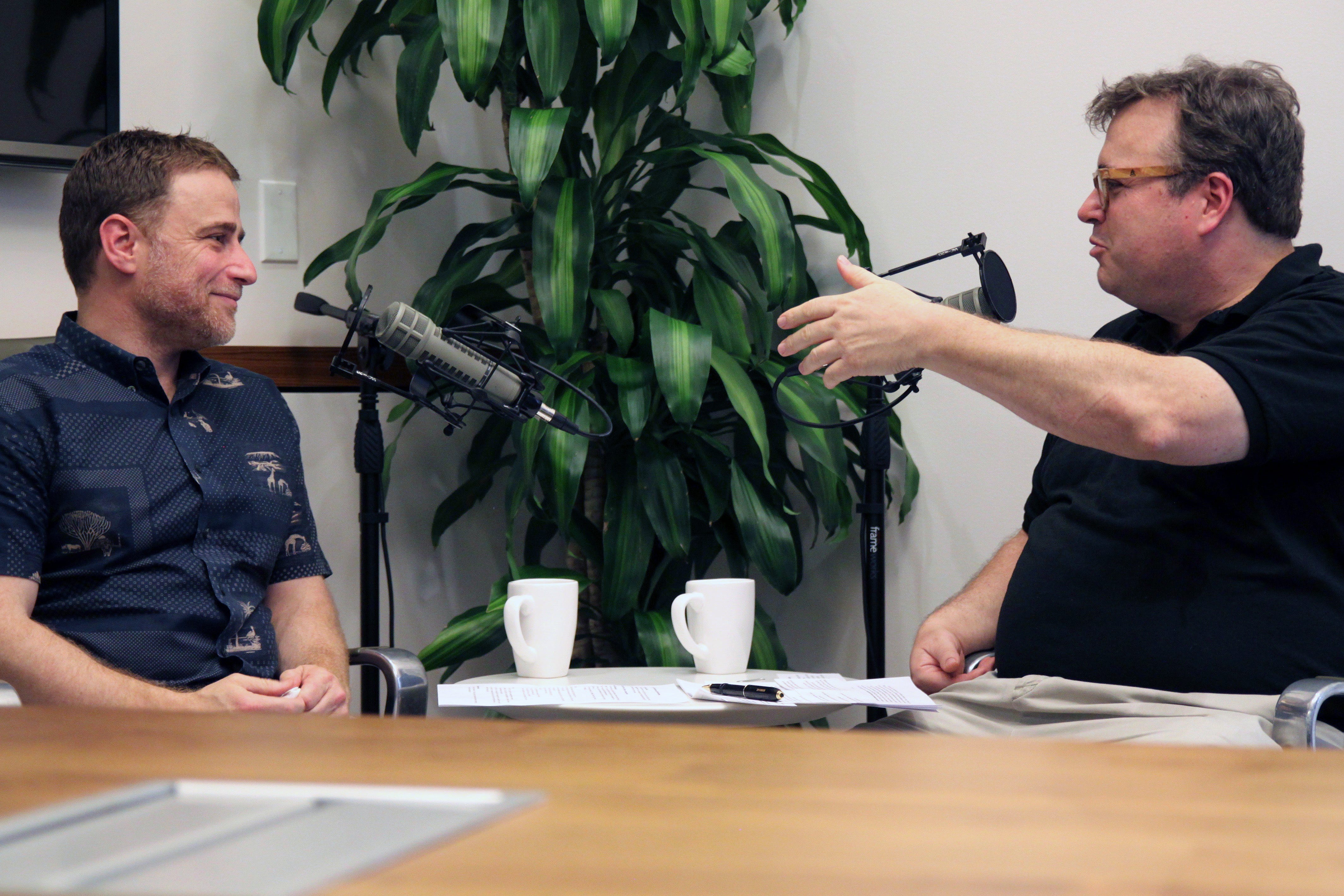- Stewart Butterfield Bio
- Stewart Butterfield Jen Rubio
- Stewart Butterfield Wife
- Slack Ceo Stewart Butterfield
- Stewart Butterfield Linkedin
Stewart Butterfield is a Canadian entrepreneur who cofounded and helms the team messaging app Slack. He also founded the photo-sharing website Flickr, which was acquired by Yahoo in 2005. Stewart Butterfield is the cofounder and CEO of team-based messaging software Slack. In December 2020, cloud software giant Salesforce announced that it would acquire Slack for $27.7 billion. Slack CEO Stewart Butterfield will continue to lead Slack as an operating unit within Salesforce. As per the report, the software company plans to merge Slack with its Salesforce Customer 360 software. The latter collects a company’s customer information in one place and Slack would be its new interface.
Butterfield, 42, is changing the way companies interact. In August 2013, he cofounded communications platform Slack, which has raised $340 million from investors including Andreessen Horowitz and Google Ventures. It’s now worth $2.8 billion. Butterfield is no stranger to launching successful companies. He previously cofounded photo-sharing site Flickr, which was acquired by Yahoo for $25 million in 2005.
What do you actually do all day in your job?
Mostly I read and write messages. I’m kind of like an old-time telegraph operator, except I actually have to think about the content of incoming messages and composing the outgoing ones myself. I also have a lot of meetings (with actual and potential candidates we’re considering, with journalists and, occasionally, with investors).
How many hours do you sleep?
As many as I can! I am too old now to get by on too little sleep, and if I can get nine hours, I take it (typical on a weekday is more like seven though).
What do you eat for breakfast?
Stewart Butterfield Bio
Plain “real” yogurt (i.e., 10% fat: nonfat yogurt is basically poison) with a bunch of seeds mixed in (chia, hemp … real hippy stuff) and then a little unsweetened cereal. The rest of my meals are much more indulgent.
If you could pitch to one person, who would it be?
Warren Buffett (with Charlie Munger as an acceptable substitute).
What's on your homescreen?
Slack (of course!), Twitter, the Kindle app, Google Maps, Pocket, Sunrise, Camera, a bunch of the default apps and eight folders crammed with other less-used stuff (I just cleaned up).
How often do you exercise?
As much as I can, given that I’m pretty lazy. But when I go, it tends to be intense: when I’m home, I see a trainer 3x a week and I’m usually lying on the floor gasping for breath at the end.
What app can't you live without?
Assuming I’m not allowed to pick Slack, I’d make it a tie between Twitter and Google Maps.

What's your favorite city?
It’s far too hard to pick one. I love cities. New York, Montreal, London, Amsterdam, Tokyo, Hong Kong, Singapore, Sydney, Melbourne, Toronto, LA … but, I do choose to live in Vancouver. It’s home.
Uber, Lyft, or yellow cab?
Uber. I’d like to try Lyft, but they (stupidly!) don’t make the app available in the Canadian app store, so even though I spend almost exactly half my time in the U.S., I can’t use it.
Are there any social platforms you refuse to participate in?
I wouldn’t say I “refuse” to participate in any; but I do “decline” to participate in most.

What are you reading right now?
Five different business/management books simultaneously (I’m genuinely trying to get better at my job since I am right now about a C-/D).
Last thing I read for fun was The Martian (which is great!).
Best piece of advice you've been given?
Stewart Butterfield Jen Rubio
A two-way tie:
“Every job you do has your signature on it. Do you want to sign your name to that?”
-- My father, to an 11-year-old me, in reference to a very poorly-stacked pile of firewood.
“Don’t become an academic: If you’re interested in this stuff, you can subscribe to the journals and go to the conferences, but don’t actually become a professor.”
-- My favorite professor to a 22-year-old me, then on a path to becoming a philosophy professor.
What keeps you up at night?
Almost everything, but especially work. And, within that, especially interpersonal conflicts or problems people are having dealing with each other.
If you could tell your 18-year-old self one thing, what would it be?
It gets better! And get more exercise.

Slack is an extremely successful software company. If you have never heard of it, it is a easy way to bring all of your communication together. Slack makes it possible to create a team channel, where you can send direct messages, make voice and video calls, help you communicate in a variety of other ways all in one place. It is considered to be one of the fastest growing business apps ever. The CEO of this company is a man named Stewart Butterfield. If you have never heard of him or his company, read on. If you have, you might just learn more about him that you thought your ever could.
Slack Wasn’t Stewart’s Business
Before Stewart started working on his $2.8 billion startup, Slack, he found success in another venture. He is responsible for the startup, Flickr. Soon after its popularity grew, he sold it to Yahoo for over $20 million. That was nothing compared to the amount of money that he has made with Slack.
Stewart was Very Poor
Stewart was born in 1973 and he grew up in Lund, British Columbia in a small fishing village. When he was born, his name was Dharma because his parents were hippies. When he got older, he changed his name to Stewart. His family lived in a log cabin and they didn’t have any running water going into the home until he was three years old. By the time he was 5 years old, the family was doing better financially. They moved to Victoria and a few years after the move, they were able to afford to buy their first computer.
With His Computer, It Was Love at First Sight
Stewart Butterfield Wife
The day Stewart’s family brought the computer home, he fell in love with it instantly. He played around on the computer so often, that he taught himself how to code when he was just a little kid. When he was in college, he used his love and knowledge of computers to make money designing websites for other people and businesses. He says that he was one of the first groups of kids to have the luxury of growing up with a computer.
He Didn’t Study Computer Science
Most people who have made billions in Silicon Valley went to the top schools like Harvard, Stanford, and MIT and they studied computer sciences. That isn’t the case with Stewart. He attended the University of Victoria, where he got his BA in philosophy in 1996. In 1998, he attended the University of Cambridge, where he got his Masters in Philosophy. Everything that he learned about computers he learned on his own. It just goes to show you how smart and talented he is.
Grandfinder.com
In 2000, just two years after getting his Masters Degree in Philosophy, Stewart joined his friend, Jason Classon in Classon’s startup company Gradfinder.com. This was right when the internet bubble had burst. According to Stewart, even though it was during the post-economy, they were still able to sell the company for a healthy profit. After the sale, Classon went on to work for Highwired, the company who bought Grandfinder.com. Stewart went on to become a freelance web designer.

Stewart’s Competition
Stewart started a competition which he called the 5K competition. The competition encouraged people to design websites in under 5 kilobytes. The contest became very popular, and people from all over the world were trying to meet the challenge.
Stewart’s Failed Venture
Stewart, his former partner Jason Classon, and Stewart’s then wife, Caterina Fake all started a company called Ludicorp. The intention was to build a massive multiplayer game online. They tried to do it right after 9/11 and right after the tech bubble burst, therefore, they couldn’t raise enough money to get off the ground.
Flickr and the End of His Marriage
Slack Ceo Stewart Butterfield
When Stewart got the idea for Flickr, he in a New York hotel throwing up because of food poisoning. He and his team created Flickr, which was a site where you could share photos with people. Very early on, he realized that it wasn’t as functional as he would like. The problem was that you could only share photos if both people were currently online. It wasn’t long before Stewart made the necessary changes. Soon after, he sold Flickr to Yahoo for $20 million. As part of the agreement of the sale, Butterfield and his wife were given jobs at Yahoo. In 2008, they both left Yahoo and they also split up. They did, however, have a daughter during their marriage. Her name Sonnet Beatrice. Only time will tell if she will follow in her footsteps and change her name one day. In it’s time, Flickr was huge. It got the creative team on the cover of Newsweek.
Slack is Born
After leaving Yahoo, Stewart still wanted to create to the multiplayer game that he started when Lutdicorp was in business. He got some of his coworkers from Flickr and Ludicorp together and they started a tiny startup company called Tiny Speck. Together, they built the game and called it Glitch. Unfortunately, they made some poor technical choices, and the game was just too weird for some people and the game didn’t take off. Stewart didn’t want to give up on the idea of doing something amazing, so he started on the communication tool that he and his team built so that they could chat and communicate. They called it Slack and decided to put it out there to see how it was received. It did great. According to Stewart, Slack is much bigger than Flickr because there are 10 times as many people online as there were in Flickr’s day.
.jpeg)
Stewart Butterfield Linkedin
Stewart Butterfield New Worth
Stewart has made a real name for himself. He has also made a great deal of money. Currently, his net worth is estimated at $650 million. Stewart had a great idea and he sold it for a fortune. He didn’t make the best choices on his next project, but he didn’t let that stop him. Instead, he turned it into a billion dollar business and things have been great ever since. According to Stewart, he still isn’t happy with Slack, and he says that he and his team are still working to make the product even better.
